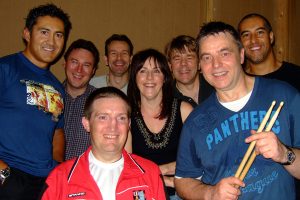
L-R: Ben Lourie, Ian Sunderland, Simon Smith, Dave Rushby, Carrie Martin, Jim Orwin, Pete Sherwood, Dominic Lourie (19 October 2006)
Simon Smith was diagnosed with Motor Neurone Disease (MND) – also known as Amyotrophic Lateral Sclerosis (ALS) – in early 2005, but continued to inspire others, with his bizarre mix of realism, determination and humour. His drive to produce something positive from a disease that he knew would eventually kill him inspired one Passion Spent band member, Carrie Martin, to persuade the other members of the band to agree to play a couple of gigs to help Simon to raise as much money as possible for the Motor Neurone Disease Association.
For those who know very little about MND – and that includes me, the rest of the band, and our friends and families – we’ve created links to a number of Web resources where information is available, including the Motor Neurone Disease Association’s website. These can be found in the links at the bottom of our Simon’s story page.
I do have a couple of issues with some aspects of the information presented on some of the MND/ALS websites: this stems mainly from inconsistencies in both the detail of information given and in the phraseology used to express the information. Moreover, the documentation can often be bland and sanitized – even patronizing. (For example, at the time of the charity gigs in 2006, the Motor Neurone Disease Association published a document called Your personal guide to Motor Neurone Disease that advises [p.26]: “You could see this as an opportunity to make changes for the better – you can develop closer relationships with family and friends, make new friends with others sharing your experiences, learn about computers and how to communicate through the internet, and so on.”) This is not to underestimate the scope and quality of the work carried out by these organisations. We each deal with life events in our own unique way, and I’m sure these organisations – including the Motor Neurone Disease Association – with their wealth of expertise and experience, strike the right balance for the majority of people.
The various MND/ALS organisations around the world have their own individual approach to delivering information about the disease, and links to a number of these MND/ALS related websites can be found at the bottom of our Simon’s story page. I found the website of the International Alliance of ALS/MND Associations a very good place to start.
Here, I intended to present a list of instant facts about MND/ALS, but there are a number of contradictions between the information given by the (British) MND Association and the information given by other MND/ALS organizations, such as the ALS Society of Canada. However, they do agree and use the same phraseology on the following two points:
- MND is not contagious
- MND cannot be cured
Although one particular statistic from the MND Association’s website might be accurate: “50% of those diagnosed with MND die within 14 months”, clearly some sufferers live with the disease for far longer. One such example is internationally renowned theoretical physicist Stephen Hawking, who was probably the highest profile MND sufferer on the planet, and who was diagnosed with MND at the age of 21 – at the time of the charity gigs (2006) he was 64 years old, and he lived to the age of 76. His is, of course, an exceptional case: the statistics show that life expectancy for most people (80%) with MND is just two to five years. However, ALS sufferer Steven Shackel also had an interesting story to tell on his ALS/MND website (archived resource at archive.org), so please check that out, along with the others. All the websites we provide links to contain links to other MND/ALS resources, if you feel the need to discover even more information about the disease.
I don’t want to make a vain attempt to re-interpret the widely available and varied information on MND/ALS, but I hope reading this page has triggered your curiosity to learn more about the disease. I would encourage anyone who has put up with what I’ve been saying up to this point to read Simon’s description of his personal experience of MND (link below) before exploring further: start with the links on Simon’s page and see where those links take you.
Jim Orwin
Read Simon’s story